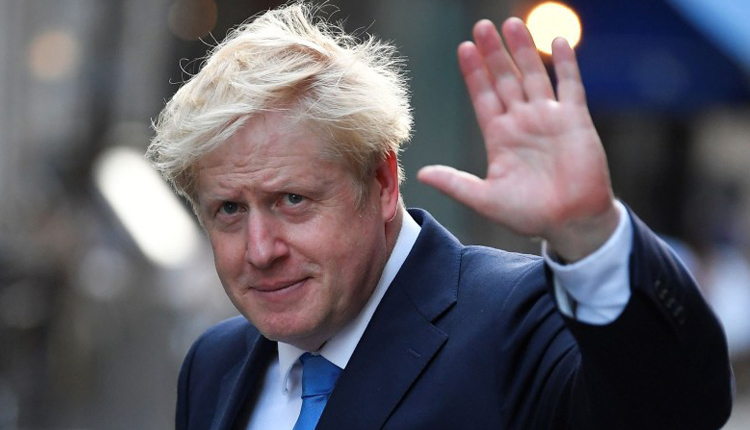U.K. Prime Minister Boris Johnson has lost a second bid to hold a snap election, making it more likely that he will have to ask the EU for an extension to the current Brexit deadline.
Only 293 out of 650 lawmakers in the lower house of parliament supported the government’s proposal — falling short of the two-thirds majority, or 434 votes, the government needed.
The vote early Tuesday morning was the second time in a week that lawmakers turned down Johnson’s request for an early election. Parliament has been suspended for five weeks and lawmakers will return on Oct. 14.
Addressing the parliament after the result, Johnson said: “This government will not delay Brexit any further.”
He vowed that the government will “press on with negotiating a deal, while preparing to leave without one.”
“I will go to that crucial summit on October the 17th and no matter how many devices this parliament invents to tie my hands, I will strive to get an agreement in the national interest,” Johnson added.
During the debate Monday, Labour Party leader Jeremy Corbyn said his party will not vote for an election until the possibility of a no-deal Brexit at the end of October has been taken off the table.
“Until … no-deal has been taken off the table… we will not vote to support the dissolution of this house and a general election,” Corbyn told parliament. Britain is due to leave the European Union on Oct. 31.
“We’re eager for an election. But as keen as we are, we are not prepared to risk inflicting the disaster of no-deal on our communities,” Corbyn said.
It was widely expected that Johnson would lose the vote, having lost a bid to hold a snap vote last Wednesday amid upheaval in British politics. A week ago, a majority of lawmakers (including members of the ruling Conservative Party) voted to take control of the parliamentary agenda from Johnson’s government.
A majority then approved legislation to block Johnson from being able to oversee a no-deal Brexit on October 31.
That legislation — which stipulates that Johnson must ask the EU for an extension to the Brexit deadline if no deal is approved or rejected by parliament by October 19 — received royal approval and became law on Monday, making it ostensibly illegal for Johnson to defy it.
Opposition parties had already agreed that they would not approve Johnson’s motion to hold an early election before the legislation to prevent a no-deal Brexit was enshrined in law, or a delay was secured from the EU. An early election could have strengthened Johnson’s hand to repeal the legislation and proceed with a no-deal Brexit.
In typical flamboyant fashion, Johnson has said he would rather “die in a ditch” than ask for more time from the EU. As such, it is still unclear whether the government could try to circumvent or challenge the legislation.
When asked whether the prime minister could defy parliament by pursuing a no-deal Brexit, the government’s Brexit Secretary Stephen Barclay was coy, telling CNBC Sunday that “the ministerial code requires obeying the law … but the key issue is how do we deliver on the democratic results of the British people.”
Parliament will be suspended by the close of business Monday and will re-open on October 14 for the start of a new parliamentary year.
Even if the government does end up asking the EU for another delay to its departure to March 31, 2020, (the original departure date was meant to be March 29, 2019) it’s not clear whether the EU would approve a delay; France, in particular, is not keen and could potentially veto the move.
Ahead of the election vote Monday, Brexit watchers had already noted that it made little sense for opposition parties to give Johnson the early snap election ahead of the Brexit departure date, although a snap vote is still expected before the end of the year.
“It would be better for the rebels to force Johnson cap in hand to go the EU Council (meeting) on 17 October to ask for an extension first, or to let him refuse before toppling him in a vote of no-confidence — that would give rebel MPs, if they can organize, control over the election timetable,” Kallum Pickering, senior economist at Berenberg Bank, said in a note Monday.
“Therefore, while we expect a snap election before the end of the year, we do not expect it to be triggered before a further delay is secured — implying 17 October onwards. Hence, we doubt there will be an election ahead of the currently planned Brexit day on 31 October,” he added.
Having only been elected to lead the Conservative Party in July, Johnson’s authority has already been sorely shaken by key resignations from his cabinet because of his renegade approach to Brexit. His own brother resigned from the cabinet last week, saying he was torn between “family loyalty and the national interest.”
Another key minister Amber Rudd resigned on Saturday night, saying that she didn’t believe the government was doing enough to get a deal with the EU.
A key stumbling block to the Brexit deal being approved by a majority of the U.K. Parliament is the contentious “backstop” policy regarding Northern Ireland and maintaining a frictionless border with the Republic of Ireland.
Having met his Irish counterpart in Dublin on Monday, Johnson insisted it was possible to find a practical solution to get around the “backstop” problem and that he wanted a deal with the EU
source: CNBC


